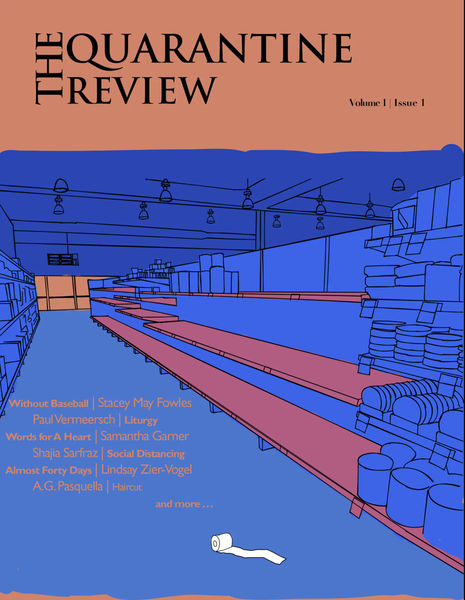Locked Down and Longing for Community: The Genesis of The Quarantine Review
By Jeff Dupuis and Sheeza Sarfraz
It started in a pub on the Danforth, the bar filled with older gentlemen dejected at the cancellation of the Dave Mason concert at the Music Hall a half-block away. COVID wasn’t real to them yet, as it wasn’t to many of us. They rested their arms on the burnished wood, turning pint glasses in slow circles on cardboard coasters and lamented the lost opportunity of seeing the Rock-and-Roll hall-of-famer, as though they’d been cheated. When the book launch started, they were no less upset.
“It’s too loud in here,” one of them said before climbing down from his stool and leaving the bar. That was just as the book launch was about to begin and the bar had filled with a more diverse crowd. It was the launch of Roanoke Ridge, the first Creature X book, and my debut novel. It was also the last in-person event to promote that book, and the last time I was at a literary event in public.
I started counting my blessings after two weeks had elapsed and it was clear that the launch wouldn’t go down in history as a super-spreader event. Then, I felt an odd sense of survivor’s guilt. Why was I lucky enough to launch a book to a crowd when so many of my peers were now confined to virtual launches, which, in their infancy, were awkward for all parties involved.
The onset of COVID-19 and the measures to keep it in check led to an increase in the number of chat groups I was a part of, as well as Zoom birthday parties and online game nights I attended. My sense of community with other writers and creatives only grew as we sought out new ways to bond and share our work. It was through the desire of community and these networks of talented people that The Quarantine Review was born. Co-founded by fellow writer and editor, Sheeza Sarfraz.
Though we only had two names on the masthead, it was within a circle of friends that The Quarantine Review was made possible. Between Sheeza and I, we had editing, writing, publishing and journalism experience, but that wouldn’t be enough. Literary agent Kelvin Kong and publisher Scott Fraser were quick to support the idea, as were novelists and poets Teri Vlassopoulos, Lindsay Zier-Vogel, Roseanne Carrara and Samantha K. Garner. They not only offered material support, but they showed us that others shared a desire to stay connected through writing and art as we were all sidelined in our homes for the first of many lockdowns.
We ran up a large tab of favours among our creative friends, receiving advise from editor Bryan Ibeas and submissions from Paul Vermeersch and Andrew Wilmot. Then word started to spread and submissions came in from other amazing writers before we had even set up an email address or website. Writers that we had long admired, like Catherine Bush, sent in pieces, and suddenly we had a literary magazine on our hands.
The question became, what kind of literary magazine would The Quarantine Review be? What might a lit mag born in pandemic times address that was not already included in the numerous other journals that we read and loved? It came back to that sense of community. The Review set out to be a newsletter for a changing world, but rather than providing updates and newsflashes, we set out to tell the story of the COVID-19 pandemic through poetry, art, fiction and creative nonfiction.
We also wanted to supplement these pieces with interviews with writers, actors, singers and other creative people, so we could share our experiences, coping mechanisms and life hacks to help each other find solace in strange times: How does a jazz singer transition from performances in a club to Instagram Live? What inspires an award-winning author to create book cover-inspired makeup looks on social media? How does a TV star and playwright continue to work when the rest of the world, including live theatre, has shut down?
In chatting with these luminaries and sharing essays by writers coping with the pandemic, we found something that we were longing for, the kind of connection that was now missing in our day-to-day lives. In the world of lockdowns, every social interaction was curated and tightly controlled. Everything random about human interaction had evaporated. Overhearing the next table at a restaurant, the endless deviations a conversation makes at a party, the unpredictable topics broached when chatting with a friend of a friend. For many of us, we now had a set list of contacts with whom we spoke, or zoomed, or texted, and from there, a limited range of topics we tended to discuss with those individuals. We might not hear a baseball fan’s disappointment with a cancelled season, or the heavy burden of not being able to visit an aging grandmother. We might not hear the struggles of anti-poverty activists as they fight various levels of government to see to the needs of the unhoused during this pandemic. We shared pieces that ran the gamut from frivolous to dire, and in doing so built bridges between our readers who were sheltering in place.
Through this project, we have met so many of our heroes and got to work with so many talents that we admire, yet, have not met any in real life. Through The Quarantine Review Podcast, we have at least spoken to contributors, matching faces to names, voices to the words on the page. We hope to continue connecting writers and readers, to give writers a platform as in-person events are still scarce, and to supplement and promote those events when they do eventually take place. The community that has built up around the journal filled the void created by the pandemic’s disruption of our social lives. If it has done that for some of our readership, then we accomplished what we set out to do.
Your CanLit News
Subscribe to Open Book’s newsletter to get local book events, literary content, writing tips, and more in your inbox
The views expressed by Open Book columnists are those held by the authors and do not necessarily reflect the views of Open Book.
Jeff Dupuis writes fiction, poetry, and satire. He is the author of the Creature X Mysteries published by Dundurn Press. When not in front of a computer, he can be found haunting the river valleys of Toronto, where he lives and works.
Sheeza Sarfraz is a writer and editor who loves creating fresh, reader-driven stories. Sheeza also consults and manages publishing for non-profit organizations. She is glad to be self-isolating at home in Toronto.




